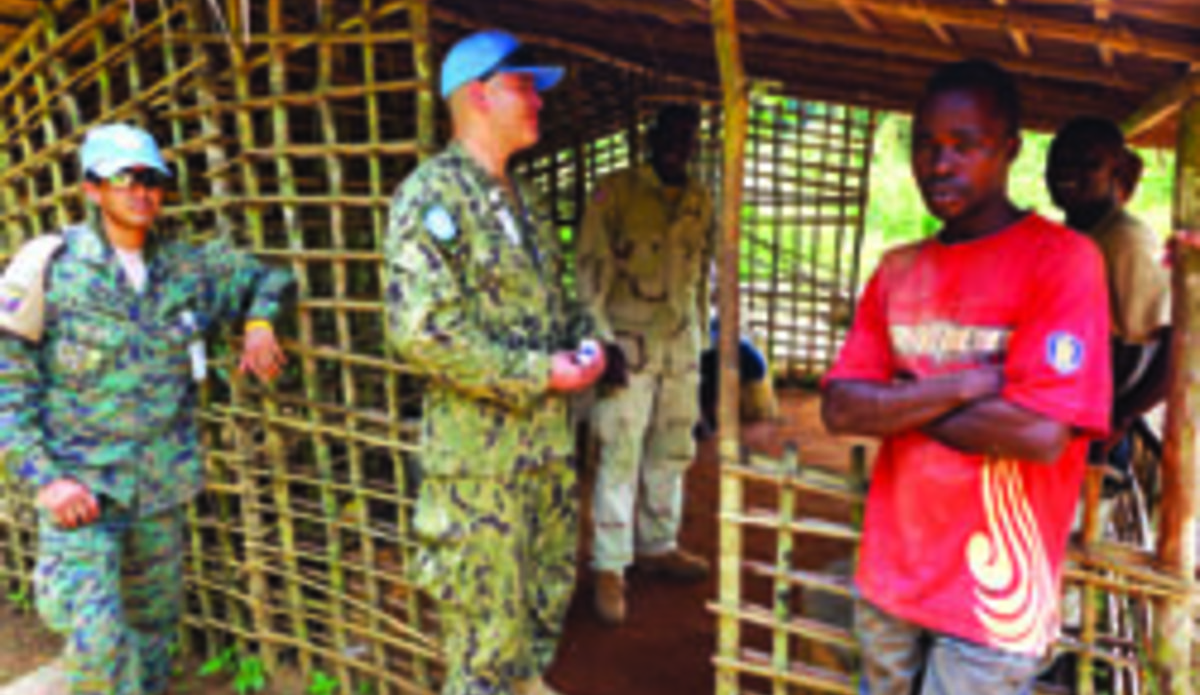A Day in the Life of a MILOB
Lt. William Abbott was driving along a highway southeast of Zwedru when he noticed a woman who had just given birth on the side of the road. She was almost 10km from the nearest clinic and desperately needed assistance. The peacekeeper did not think twice about helping her. For Abbott, a UN Military Observer based in Zwedru, it was all part of a day’s work.
“If you tell me there are problems, we’ll come here and fix them.” That’s what he told one local, and that’s the motto he works by.
Abbott, from the US Navy, is checking out this month after having completed a six-month mission in Zwedru. Every day, he and his team members were assigned a different Named Area of Interest (NAI), ranging from Rule of Law to Influence of Informal Power Structures to Religions. They would then schedule patrols to key areas of those respective NAIs.
On 15 October, Abbott and fellow Military Observer, Capt. Juan Carlos Zapata from Ecuador, went on patrol to Bartel Jam, a registered gold mining camp 37 km northwest of Zwedru. It is home to over 5,000 people, but has only two Liberia National Police (LNP) stationed there and one officer from the Bureau of Immigration and Naturalization (BIN). The closest Emergency Response Unit is based in Zwedru.
“It’s not just the local tribesmen that are at any camp,” said Abbott. “You’ve got labourers, you’ve got miners, you’ve got brokers that are from all the tribes in Liberia and also from across West Africa. At Bartle Jam, for instance, there are Sierra Leoneans, there are Ghanaians, there are Ivorians, there are Nigerians, and you put all these potentially rival tribesmen together and you spark problems, especially with the locals.”
There are 12 gold mines officially registered in Grand Gedeh County, but Abbott noted the increasing number of uncharted mines. Abbott and Zapata met with BIN Officer Capt. Matthew Wleh, who mans the Border Crossing Point close to the Cavalla River. He noted much activity by Ivorian traders transporting produce to sell at Bartel Jam, but security remained calm.
Abbott and Zapata also befriended a ‘Go-Boy’ by the name of Emmanuel, who took them around to see the dig sites and wash stations. He, too, said the camp was peaceful. UN Police had reported two labourers killed at the dig site the previous week, but on further investigation, Abbott and Zapata found it was most likely accidental.
The areas they patrol are often sensitive, particularly in Northern Grand Gedeh where there are suspicious movements happening, says Abbott, but that does not stop the locals from receiving them with open arms.
“We go around, we look around, we talk with locals, we meet with the local leaders. Most of the time they stop what they’re doing and come visit with us. If the leadership is not around, then they’ll have the town chief’s wife or husband or the acting town chief. They’ll always have somebody who will want to talk to us.”
Weather can get in the way, with rain making many of the roads in and out of Zwedru impassable, but Abbott estimates his team has been able to complete 85 per cent of its scheduled patrols.
Now, as he gets ready to leave UNMIL, Abbott reflects on what he is going to miss back home in the United States:
“Some of these towns and villages that you go to and you sit down with the town chiefs and the locals, my goodness, you take a moment to look around and you see, wow, this is actually a really gorgeous place. You’ve got palm trees, you’ve got lush vegetation. It’s just clean. The clean air, that’s what I’m going to miss the most. Out here you’re breathing almost pure oxygen.”
 UN
UN United Nations Peacekeeping
United Nations Peacekeeping





